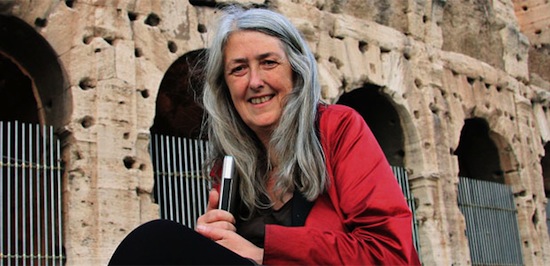Want to hear about a scandal on the radio? Listen in. On Wednesday this week, prompted by the fuss that followed Mary Beard’s appearance on Question Time, Radio 4 explored the way female pundits are treated online, and in the media at large.
If you’re not aware of the hoo-ha that preceded this, here’s a precis. Eminent Cambridge professor goes on high-profile panel show, says something liberal about immigration, and the dregs of the internet wade in to comment. Unsurprisingly, they offer little counterargument to the issues surrounding multiculturalism. Instead, to quote Professor Beard herself on Women’s Hour, they say: "an awful lot about my vagina, about its size, its shape and its smell, and what might be inserted into it". What a world.
Beard’s chat with Murray is worth ten minutes of your time – listen here. For starters, she offered the subtlest, best put-down for web-wankers that I’ve heard yet ("you get a sense of real desperation… I don’t think that people who are happy in their lives end up of a evening posting a lot of c-words and f-words"). On the question of whether people should confront bullies or ignore them, her answer came, rather brilliantly, from the Classics classroom. "Women are always being told shut up and take the abuse, otherwise you’ll make it worse. We’ve been told that for millennia. It’s about time to say, sorry mate, not on!"
But enough of that: here’s the thing that really boiled my blood. That same afternoon, The Media Show ran a special on Women On Radio And TV, exploring precisely why there aren’t enough female pundits on programmes (listen here). The excellent Steve Hewlett introduced his wide-ranging panel, which included editorial directors from Sky News and ITN.
Then he paused, and his tone hardened somewhat: "We asked BBC News, but no one from there was available to join us."
Lis Howell, Director of Broadcasting at City University, then described the weighty research she had done on this topic, and statistics that proved that women were under-represented. She had then approached news networks with recommendations, which Sky News had signed up to, as did Channel 4. "The BBC has not agreed to do so," Howell added, quietly. "The BBC doesn’t seem to take part in the debate at what you might call an intellectual level at all."
To recap: commercial networks realised they weren’t doing something properly, and acted accordingly. A public service broadcaster wouldn’t even countenance the idea that they weren’t giving women a voice. Women who make up half of their audience, to whom they have a remit, as you might have imagined.
By this point, I was offering my own f-words to the radio. Then the BBC’s Training Academy Director, Anne Robinson, talked about the editors and commissioners she’d spoken to. These poor souls struggled to get experts, that happened to have wombs, in these fields: science, technology, engineering, politics, business, architecture and history. I have some tips for them. Try almost any university in the country: experts teach there. Go to Parliament – wow – 144 female MPs. Knock up a quick spreadsheet and share it around, like Sky and ITN seem to have done. Go beyond a quick Google and lo – oestrogen and progesterone EVERYWHERE.
Of course, there are other factors that complicate this issue, which The Media Show explored well. Women won’t go on programmes for fear of reprisals, like Beard. They don’t get as much practice as men, and therefore can’t be as "perfect". Childcare can make certain slots difficult (oh, if only there were pre-records, or fathers that had children too). TV and radio debates can also be pretty combative, which lots of women don’t like. This is a massive generalisation – which opens up a whole new can of worms – but it also proves again that programmers should stop setting up duels, as I’ve banged on about before (find the part in this piece where I’m asked whether I loved or hated Madonna). Subtlety doesn’t have to harm news reporting, you know. It could also enrich it.
Sky News’ Tamy Mitchell also showed how easy it could be news-makers to be imaginative. When some pioneering breast cancer research was recently published, she insisted that the man who conducted it was paired up with a woman who had suffered it. The Today programme researchers tried to find someone to pair up with him but failed. Presumably because breast cancer doesn’t affect lots of people who might listen to their sho… oh.
Murdoch 1, Auntie 0. As I said, what a world.
And as I promised last week, here’s a non-BBC tip. I’ve been starting to explore Amazing Radio’s output, and Simon Raymonde’s Monday programme is a good way in. The former Cocteau Twin and Bella Union boss doesn’t just wallow in shoegazey, dreamy pop either – new electronica, reggae, and dubstep were all present and correct. I loved Blacksmif’s ‘Gavelock’ (a driving, pulsing atmosphere and ace piece of wub-wub), while Raymonde’s geeky presenting style was also a tonic. "Did you know that Anchorage was one of the most desirable places to live in America?" he asked, before before taking the piss out of his inner-Partridge. "Fascinating stuff!" Oh, the humanity. Boys and girls, let’s have more of it. listen here


